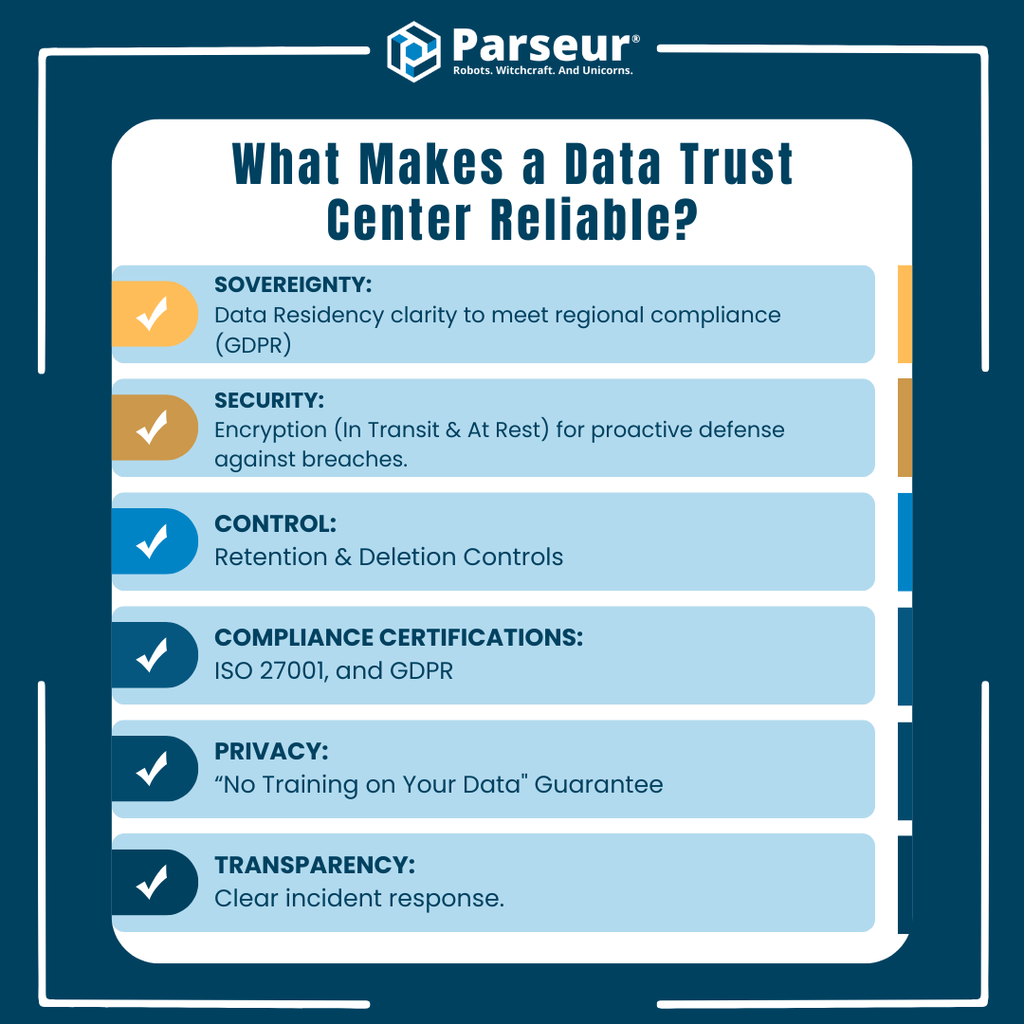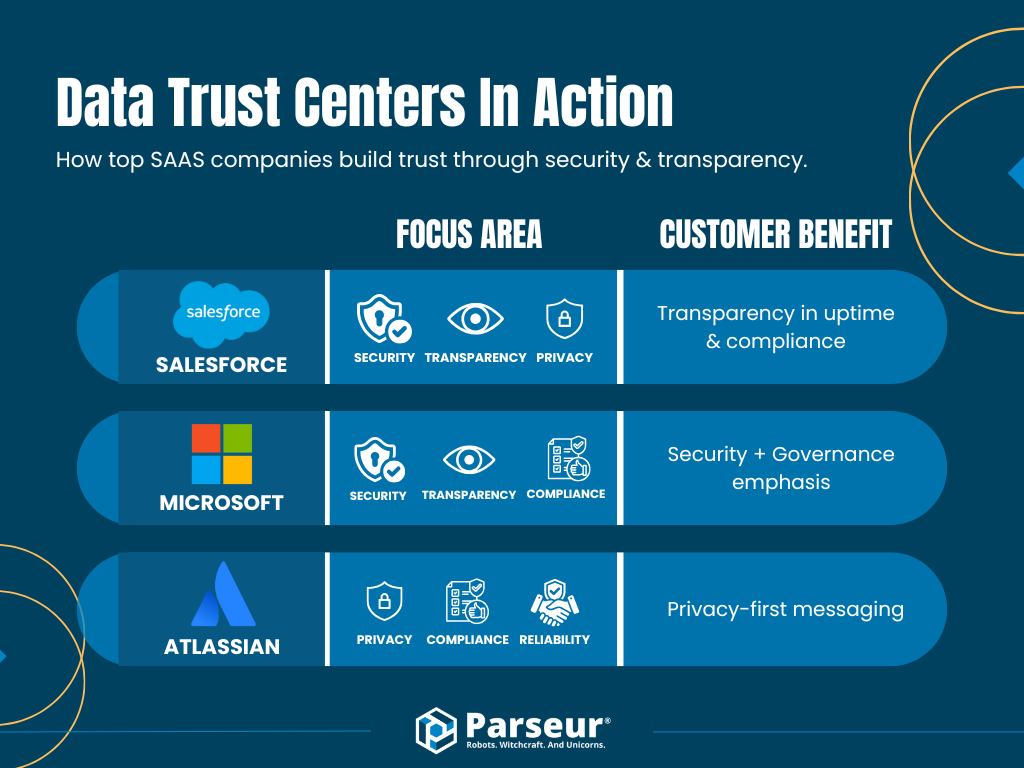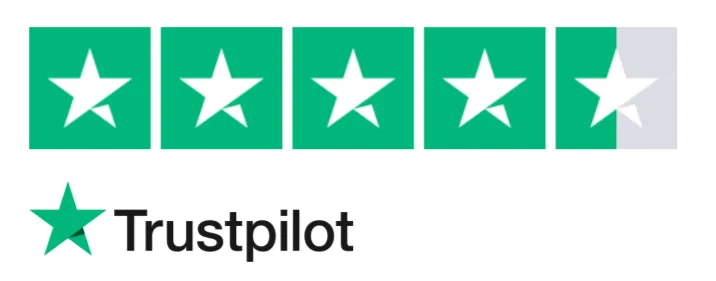A Data Trust Center is a public-facing transparency hub that outlines how an organization protects, processes, and governs customer data. It is a single source of truth, where customers, partners, and auditors can review critical information, including security policies, compliance certifications, privacy practices, and data protection measures.
Key Takeaways:
- A Data Trust Center is a transparency hub that proves accountability in data management and protection.
- With the widespread adoption of AI and automation, data trust is no longer compliance; it’s a strategic advantage.
- Parseur builds trust by design with enterprise-grade encryption, compliance, and a no-training-on-your-data policy.
As businesses rapidly adopt AI and automation technologies, enterprises demand more than efficiency; they require trust. A Data Trust Center is a centralized transparency hub where companies publicly share their security measures, compliance certifications, data governance practices, and privacy policies.
As automation, AI, and data-driven decision-making become deeply embedded in enterprise workflows, trust is no longer an afterthought; it’s a competitive advantage. According to Ataccama, 74% of organizations have implemented AI-based solutions, yet only 33% report company-wide adoption, highlighting a persistent trust gap around responsible AI and data management.
At the same time, only 44% of consumers report trusting even the most reliable digital sectors (such as banking), illustrating that customer trust remains fragile and must be proactively earned through strong data governance practices, according to Thales. A well-structured Data Trust Center helps businesses prove their commitment to enterprise data security, AI trust, and regulatory compliance. It gives customers and partners confidence that their data is managed responsibly.
For automation and AI vendors, a transparent Data Trust Center is quickly becoming a must-have differentiator, a tangible signal that the organization values data transparency, compliance in automation, and long-term customer confidence as much as technological innovation.
What Is A Data Trust Center?
A well-structured Data Trust Center builds customer confidence and demonstrates a company’s commitment to trust center automation, data transparency, and responsible AI. Centralizing key details like encryption standards, data residency, and retention policies strengthens enterprise data security and streamlines procurement, compliance, and partnership decisions. As a result, more organizations are formalizing their governance frameworks.
As of 2025, 71% of organizations worldwide report having an active data governance program, a sharp increase from just 60% in 2023, underscoring the broad enterprise shift toward transparency and data stewardship, based on Precisely.
Initially popularized by central cloud and SaaS providers like Salesforce, Microsoft, and Atlassian, data trust centers have evolved into best practices across industries. In parallel, the global data center logical security market, according to Fact MR, is projected to reach $12.8 billion in 2025 and nearly triple by 2035, driven by enterprise investments in cybersecurity and regulatory compliance as foundational components of trust. They emerged as a direct response to growing enterprise concerns about AI trust, data privacy, and regulatory compliance, providing visible proof that a company’s technology meets strict governance and security standards.
For automation and AI vendors, a Data Trust Center is more than just a compliance page; it’s a strategic trust-building tool. Vendors demonstrate data transparency, operational integrity, and reliability by openly sharing details about encryption, data residency, certifications, and retention policies**,** which increasingly influence enterprise purchase decisions.
Why Data Trust Matters In Automation
Within the intricate ecosystem of AI and automation, data trust isn’t just a compliance checkbox; it’s the foundation for adoption, scale, and ROI. Every automated process relies on sensitive business data: invoices, medical records, HR forms, and customer communications. Automation doesn't move forward if organizations can’t trust how this data is handled. When trust is missing, even the most advanced automation systems struggle to gain executive approval or user confidence.
In contrast, companies that establish data transparency and governance frameworks through visible commitments like a Data Trust Center or a no-training-on-your-data policy see faster adoption and more substantial ROI. This transparency creates a foundation of AI trust that encourages collaboration across technical, compliance, and executive teams. When customers and internal stakeholders clearly understand how data is protected, processed, and used, they’re far more likely to embrace automation initiatives.
Instead of seeing automation as a risk, they view it as a controlled, compliant system that enhances productivity and accountability, a key factor in enterprise-wide adoption. Specifically, Multimodal stated that 79% of organizations prioritizing data trust report smoother scaling of automation and AI projects, while 62% project ROI improvements above 100% due to enhanced data governance and transparency. That’s because trust eliminates hesitation: teams automate more workflows, customers share data more confidently, and compliance audits become smoother.
Ultimately, trust drives adoption, and adoption drives return on investment. In automation, that connection is direct; transparency and accountability turn cautious enterprises into confident innovators.
Key Features Of A Data Trust Center
A modern Data Trust Center is the single source of truth for how a company manages, protects, and governs customer information. These features form the foundation of transparency and reliability for enterprises evaluating trust center automation.

1. Data residency
Enterprises want clarity on where their data lives. A Data Trust Center specifies geographic storage and processing locations, ensuring compliance with regional regulations like GDPR or HIPAA. This visibility helps organizations meet sovereignty and cross-border data transfer requirements.
2. Encryption at rest and in transit
Robust encryption is non-negotiable. Trust Centers document how data is encrypted both during transmission and while stored, demonstrating proactive defense against unauthorized access and breaches.
3. Data retention and deletion controls
Automation platforms process massive volumes of customer data daily. A trust center should clearly define how long data is stored, the conditions for deletion, whether customers can trigger purges on demand, and the key to compliance and audit readiness.
4. Compliance attestations and certifications
Trust Centers typically include links to verified compliance credentials such as ISO 27001, GDPR, or CCPA. These attestations prove that the vendor adheres to global standards for security and governance.
5. Privacy commitments (“No training on your data”)
Modern automation trust centers go beyond basic privacy statements. They highlight commitments like no training on customer data, ensuring that information shared within the platform is used only for processing, never for model improvement or external sharing.
6. Security and incident response
Enterprises expect transparency about how vendors detect, respond to, and report security incidents. Including policies on audit trails, penetration testing, and threat monitoring demonstrates maturity in operational security.
When these elements are clearly outlined in a Data Trust Center, they don’t just inform, they build confidence. For automation vendors, transparency becomes a differentiator that accelerates adoption and strengthens customer relationships.
Examples Of Data Trust Centers In Action
The world’s leading technology companies have turned Data Trust Centers into a cornerstone of their brand credibility. These hubs don’t just showcase compliance; they communicate accountability, transparency, and security at scale. By examining how major vendors approach trust, automation providers can see what today’s enterprise buyers expect as standard.

1. Salesforce Trust Center: Transparency at scale
Salesforce pioneered the modern Data Trust Center concept, offering real-time visibility into system performance, uptime, and security incidents. Beyond compliance, it provides customers with operational transparency, proving that reliability and openness go hand in hand.
2. Microsoft Trust Center: Security and governance first
Microsoft’s Trust Center highlights its deep commitment to enterprise data security, compliance, and responsible AI practices. It gives customers detailed documentation on encryption, access control, and certifications across Azure and Microsoft 365, setting the benchmark for trust center automation in large-scale environments.
3. Atlassian Trust Center: Privacy-first communication
Atlassian’s approach centers around clear, customer-friendly communication. Its Trust Center consolidates privacy, compliance, and reliability resources in one place, ensuring customers can easily understand how their data is used and protected, a model of AI trust through transparency.
The Takeaway
These examples show that trust is now an enterprise expectation, not an optional feature. Businesses choosing automation or AI solutions increasingly look for vendors who can clearly and easily demonstrate transparency, compliance readiness, and ethical data practices.
Benefits Of Having A Data Trust Center
For automation and AI vendors, a Data Trust Center is more than a compliance tool; it’s a strategic asset that strengthens credibility, accelerates sales, and aligns with emerging governance standards.
1. Builds customer confidence
A visible data trust center signals transparency and maturity. By showcasing how data is protected, stored, and processed, vendors build confidence with enterprise buyers who demand verifiable proof of AI trust and data transparency before onboarding new systems.
2. Accelerates procurement and compliance reviews
Procurement and infosec assessments often delay deals. A well-structured trust center automation hub shortens these cycles by making compliance answers like certifications, encryption standards, and privacy practices easily accessible and verifiable in one place.
3. Strengthens competitive differentiation
In a crowded automation market, trust has become a key differentiator. Vendors with a public-facing data trust center demonstrate accountability and readiness for enterprise scale, proving that data privacy and enterprise data security are not afterthoughts but core values.
4. Future-proof against AI governance trends
As new AI regulations emerge worldwide, organizations that adopt transparent practices early are better prepared for compliance shifts. A data trust center acts as a documentation hub and a living compliance framework, ensuring alignment with evolving governance, audit, and ethical AI standards.
Key takeaway: A Trust Center doesn’t just protect your data, it protects your reputation, accelerates growth, and earns long-term customer trust in an automation-driven world.
Building Data Trust Without A Trust Center
No company needs a formal Data Trust Center page to prove transparency and integrity. What matters most is the practice of trust, not just its presentation. Vendors can build the same level of credibility by embedding trust center automation principles directly into their operations.
How to build AI trust without a public hub
- Publish security whitepapers and documentation: Share detailed overviews of data protection methods, encryption standards, and access controls to give customers visibility into security practices.
- Maintain recognized compliance certifications: Certifications such as ISO 27001 and GDPR alignment demonstrate a verifiable commitment to enterprise data security and compliance in automation.
- Adopt explicit “no training on your data” policies: Guaranteeing that customer data is never reused for AI training builds lasting AI trust and reduces regulatory risk.
- Provide transparent FAQs and retention policies: Clear documentation helps customers understand exactly how their information is processed, stored, and deleted.
Parseur’s approach: Trust by design
Even without a standalone Trust Center hub, [Parseur(/) applies the same principles that define the industry’s most trusted automation vendors. Every part of the platform is built around privacy, compliance, and accountability:
- Enterprise-grade encryption and retention controls protect sensitive data at every step.
- A strict no-training policy guarantees that customer data is never reused to train AI models.
By integrating these trust-by-design principles, Parseur offers the transparency, compliance, and data security assurance that modern enterprises expect. It proves that a Data Trust Center is as much about consistent action as it is about having a dedicated page.
The Future Of Data Trust In Automation
As automation and AI become core to enterprise infrastructure, data trust centers are quickly moving from “nice-to-have” transparency tools to standard industry expectations. By 2026 and beyond, leading SaaS and automation vendors will be expected to maintain public-facing hubs that detail their security practices, data governance models, and compliance certifications, much like privacy policies and SLAs are today.
This movement reflects a broader transformation in how enterprises evaluate technology partners. Procurement and compliance teams increasingly require continuous proof of data transparency, AI governance, and regulatory alignment before approving new tools. Rather than relying solely on contractual assurances, businesses want real-time visibility into how vendors handle, secure, and manage sensitive information. In this environment, a Data Trust Center becomes a documentation resource and a live trust signal that influences purchasing decisions, renewals, and enterprise partnerships.
In fact, based on Fact MR, the global data center monitoring market is projected to grow from USD 4.8 billion in 2025 to USD 12.5 billion by 2035, with increasing demand for infrastructure transparency driven by rising regulatory requirements and enterprise data security needs.
Moreover, Multimodal stated that 94% of enterprises report using cloud services in some form, reflecting the widespread adoption of transparent, cloud-enabled trust practices, which are expected to extend to Data Trust Centers as part of compliance and governance.
The rise of AI governance and responsible automation
The growing push for AI trust and responsible automation is reshaping how vendors handle and present data security. Regulatory bodies and industry groups are now emphasizing auditability, explainability, and data lineage, ensuring organizations can trace how customer information is processed and protected.
As these expectations evolve, enterprises move from static compliance reporting to continuous transparency frameworks. Instead of annual audits or point-in-time certifications, organizations are beginning to adopt real-time trust verification, where data handling, security controls, and AI model governance are continuously monitored and publicly accessible. This shift reflects a broader trend toward proactive trust assurance, proving compliance through action, not just documentation.
Trust center automation will play a central role in this landscape, automating compliance updates, publishing real-time uptime or audit logs, and integrating third-party validation directly into customer-facing dashboards.
Parseur’s Vision: Aligned With The Future Of Data Transparency
While Parseur already meets stringent data privacy, encryption, and compliance standards, the company continues evolving its approach to align with enterprise expectations for transparency and accountability. Our roadmap includes:
- Expanding documentation around security, compliance, and AI governance.
- Continuing our no-training-on-your-data policy to strengthen long-term customer trust.
- Exploring data transparency frameworks that reflect the openness of a future Trust Center experience.
For enterprises, the takeaway is clear: trust will define the next era of automation. Companies that invest early in transparent data practices through a formal Data Trust Center or consistent privacy-first design will lead to adoption, reputation, and ROI.
Turning Transparency Into Trust
A Data Trust Center is more than a marketing page; it’s a trust-building mechanism that proves an organization’s commitment to data transparency, enterprise security, and responsible automation. In an era where compliance and credibility drive purchasing decisions, trust is not optional; it’s strategic.
Without a formal hub, forward-looking enterprises must adopt Trust Center principles across their operations: clear governance, strong encryption, transparent retention policies, and a no-training-on-your-data stance. These practices transform automation from a technical upgrade into a reliable, confidence-driven partnership.
Frequently Asked Questions
Even as Data Trust Centers become the new standard for automation transparency, many enterprises still ask what they truly offer and how to implement the same level of trust without building one from scratch. These quick answers explain.
-
What is a Data Trust Center?
-
A Data Trust Center is a public-facing transparency portal that explains how a company secures, manages, and governs customer data, including compliance certifications, encryption standards, and retention policies.
-
Why do Data Trust Centers matter for automation and AI?
-
They build trust and confidence by showing how sensitive information is handled. In automation, trust directly impacts adoption rates, compliance readiness, and overall ROI.
-
What are the essential features of a Trust Center?
-
Key elements include data residency details, encryption standards, retention policies, certifications (ISO 27001, GDPR), and clear privacy commitments like “no training on your data.”
-
Do you need a Trust Center to build data trust?
-
Not necessarily. Vendors can achieve transparency by publishing security whitepapers, maintaining certifications, and documenting privacy practices and retention policies.
-
How does Parseur align with Trust Center principles?
-
Parseur ensures enterprise-grade privacy and accuracy through AI-powered parsing, built-in validation, and a no-training-on-your-data policy, all foundational to genuine automation trust.
Last updated on




